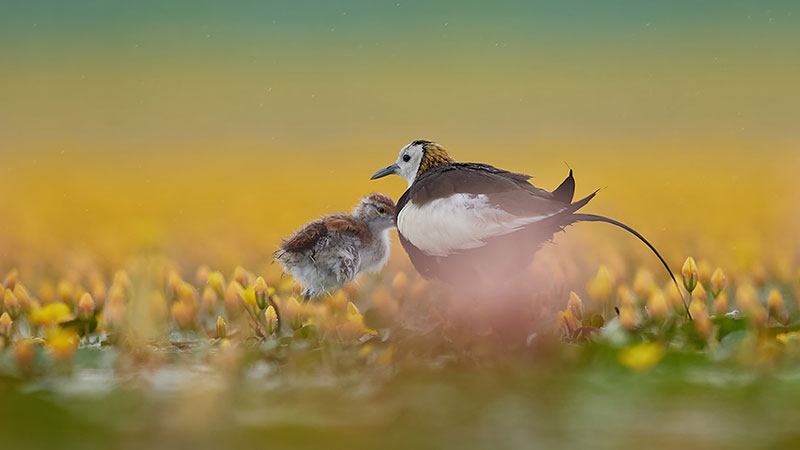David Paskett: Sketching Chinese stories with his paintbrush
Veteran British watercolour artist David Paskett is particularly fond of depicting Chinese characters and landscapes. He has visited China many times since the 1980s. Most of his creative inspiration has come from China.
Unlike most painters, who focus on tourist attractions or magnificent landscapes in China, Paskett's artistic works mostly focus on the lives of ordinary people in the country. He is adept at capturing urban life scenes or depicting realistic scenes such as rural idyllic scenery. At the same time, he has also researched traditional Chinese drama culture, deciding to focus on Kun Opera. In recent years, he has participated in several international art exchange programs related to Kun opera.

David Paskett
Paskett was previously the president of the Royal Watercolour Society, and many of his paintings are widely acclaimed among international circles, collected by museums, enterprises and private individuals alike. He is currently the honorary artistic director of Cam Rivers Publishing, an independent publishing house based in Cambridge, United Kingdom.
In this exclusive interview with People's Daily Online, Paskett shows what he believes to be the most authentic Chinese scenes, as well as his experiences with China over the years, telling the story of the country that he has witnessed during his travels.
Observing China for 30 years, recording China’s most authentic scenes with his brush
People’s Daily Online: How did you begin your 30-year China journey?
David Paskett: My first visit to China was from Hong Kong in 1986, a very brief trip to Guilin. I’ve been going back to China ever since then periodically. Over the thirty years, I’ve watched the whole attitude of China and Chinese people change.
But when I first went out there, I wasn’t looking for the big sights. I didn’t intend to go searching for the monuments like the Great Wall or the palaces in Beijing; I was just interested in what was going on in the streets. So when I walked around the streets, I was just looking for things in shopfronts and in markets – just things lying around the street – and that was my subject matter. I spent a lot of time just on a bicycle riding and walking and looking.
People’s Daily Online: We can see that in your studio that you have a lot of sketchbooks, and you keep all the ones you have used in the past. So when you are in China and you are painting, do you live painting and drawing?
David Paskett: Yes, I do a lot. My little companions are these little drawing books. These were drawings in Caoshan Temple, a Buddhist Monastery based in Jiangxi Province, where I spent several days with the nuns painting them preparing food in the kitchen. This little book has got lots of drawings there. I loved doing this, so when I’m travelling round, I have with me my sketchbook and my pens and my camera. In a way, I’m looking for things to paint when I come back. The sort of things that I will paint when I come back are often very detailed, and they’re things that I wouldn’t have time to paint something like that on the spot. It might be also moving and changing, so I bring a lot of photographs back and I paint using photographs.
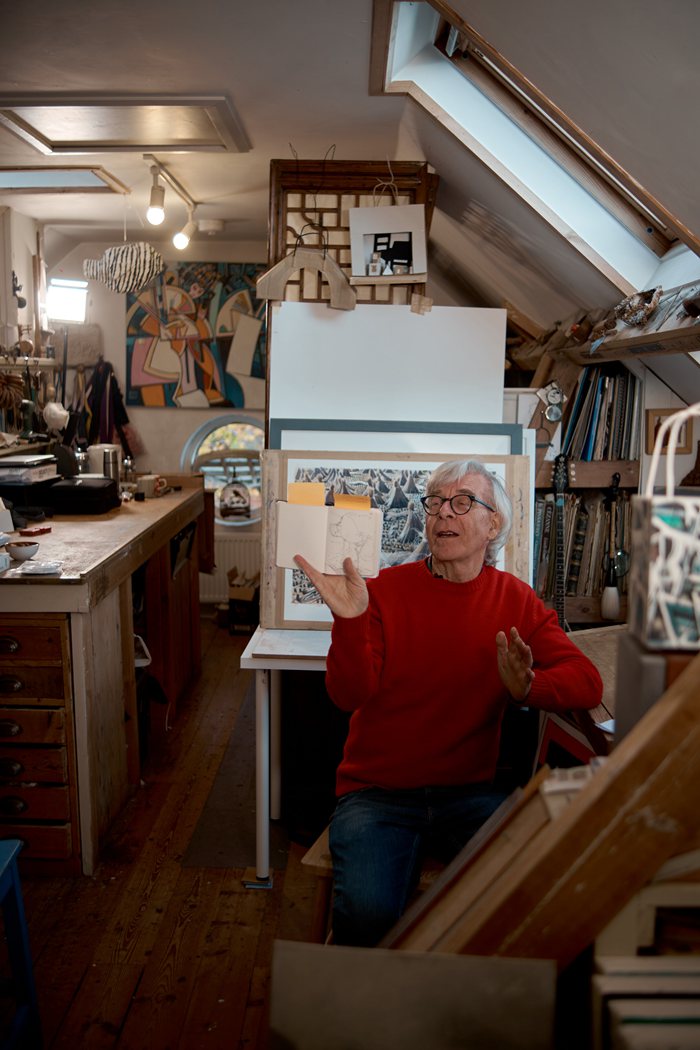
David Paskett
But I also, in many ways, value more the drawings I do on the spot. As we see in the studio, I’ve got many paintings that are from memory. People will look at my different ways of painting and they think, “he does so many different things.” But if you look at them carefully, you will see there are connections between them all.
People’s Daily Online: Why do you think you managed to excel in this genre of art?
David Paskett: Because I have got quite wide interests and I’m easily distracted by things. My eyes are open and I’m dashing around looking at things. Anything that looks interesting will take my attention and I will be drawn to it.
If there are musicians, I’ll end up drawing or even playing with them. I think I’m interested in the people as well when I go, so when I’m painting with my sketchbook it’s often the people I’m drawing. If one is interested in people in the way they live and the way they’re thinking and the way they’re dressing, and where their houses are, or whatever, it’s endlessly interesting.
If I would go to a town where the guys are out there laying the pavement, well that’s interesting to watch them do that. I’m interested – if someone is mending their boat, that’s interesting. All of these things, they’re interesting as subjects, so I can just watch that for a long time. So the drawing and the painting and my general interest in things keeps me alive.
Interest in Kun Opera, exploring the depth of the culture under traditional Chinese art
People’s Daily Online: Many of your visits to China were connected with Kun Opera. Can you talk about your travel experience related to Kun Opera or Tang Xianzu?
David Paskett: Yes, this for me has been very central to my life over the last few years, having with my Chinese colleagues gone to see some live performances of Kun Opera in Suzhou and Nanjing. And actually first, in Cambridge – that was my first taste of Kun Opera when I was finding out about it.
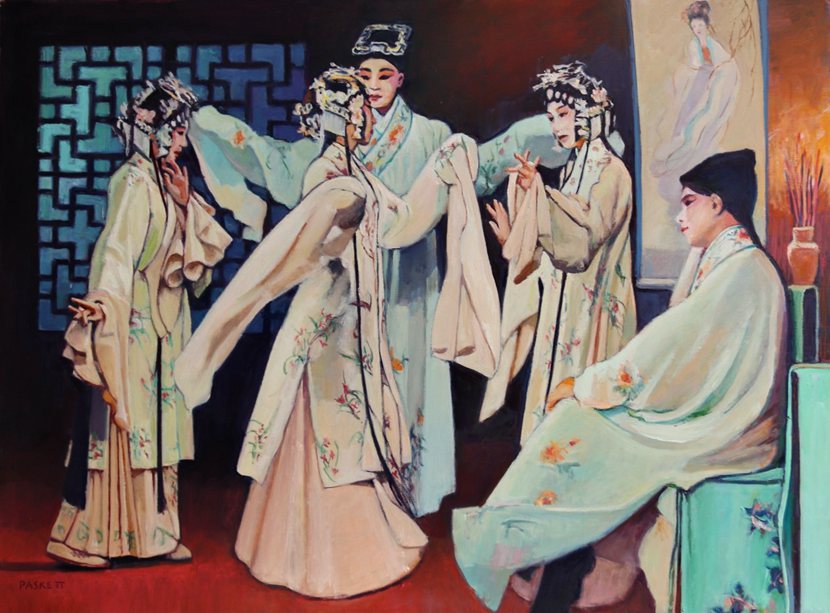
A painting of The Peony Pavilion by David Paskett
Previously I had seen opera on the stage in the streets in China, and of course in Hong Kong, there’s Cantonese Opera. But I hadn’t followed the story and the music, and the focus of being taken to Fuzhou and Jiangxi Province was to see where Tang Xianzu was born and to find out about Tang Xianzu who wrote The Peony Pavilion. My interest in this has blossomed. I’ve seen musicians rehearsing in Suzhou. I’ve become accustomed, if you like, to the sound. Actually, Chinese music to Western ears takes a little bit of getting used to.
And through the visits to China and studying this, I’ve been learning a bit about the philosophy of the time it was written. Tang Xianzu wrote The Peony Pavilion and other works at the same time as Shakespeare, in the late 16th century and early 17th century. So going to Fuzhou, we were actually taken around the museums and we visited places where the philosophers and the thinkers, the scholars, of the time who were friends of Tang Xianzu, were living.
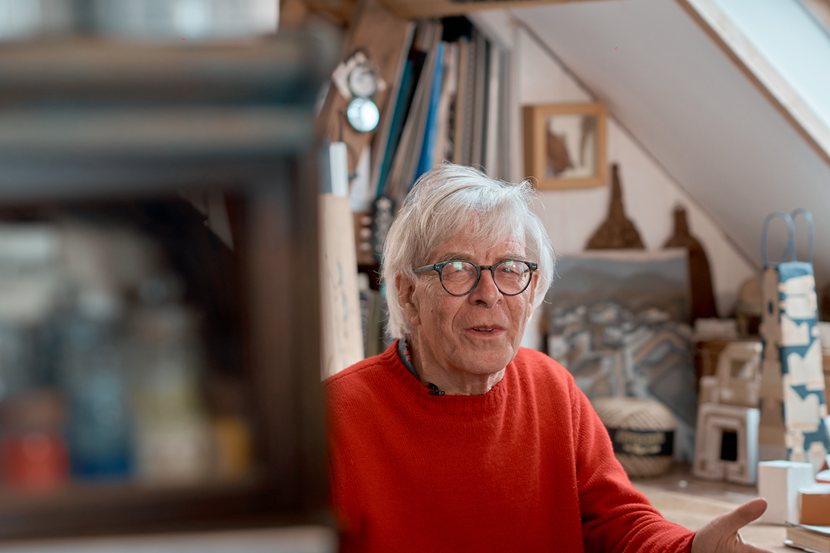
David Paskett
People’s Daily Online: You also drew the illustrations for the English version of The Peony Pavilion in the biography of Tang Xianzu. Could you elaborate on how you went about doing this?
David Paskett: Through the painting of The Peony Pavilion, I’ve had to really try to get a bit of understanding of what the story is about; what is underneath it, and the way that it is about freedom of living a free life based on one’s heart, compared with living a sort of structured, Confucian, ordered sort of life. When I started painting, I wasn’t so aware of that. I was showing the interaction and the love scenes, the sort of interaction between people. But gradually, through doing the painting, I’ve realised there are a lot of layers in it, and that has made this series of paintings which isn’t finished yet, and I’m changing my ideas as I go along.
This book - Tang Xianzu: The Great Chinese Playwright from Jiangxi Province, China was published by Cam Rivers Publishing in 2022. It was authored by Professor Zhu Hong, a senior scholar from Jiangxi Province, the hometown of Tang Xianzu. It is the first English version of the biography of Tang Xianzu.
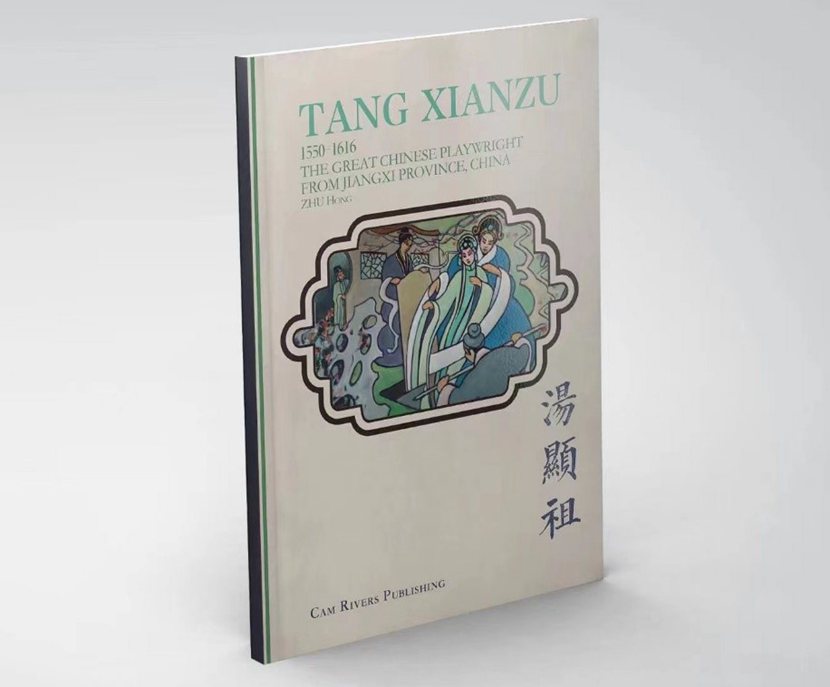
Tang Xianzu: The Great Chinese Playwright from Jiangxi Province, China
Artists should meet with each other
People’s Daily Online: As a veteran artist, how do you think you can improve the understanding and collaboration through art between China and other countries?
David Paskett: Well, I think the artists have to meet each other. Things don’t sink in unless you experience the people and the places, and once you’ve been to the place and met the people then you have a connection. I think very few people establish a distant sort of relationship on an academic basis when they haven’t visited somewhere.
I go to China and my feeling about China is based on the people I met. All through Chinese history the philosophers have been interested in sociology, in how people live and how to have communities. China has been through different sorts of political stages, but in actual fact, what is the basis of it is how people can live together happily.
I think my first early trips – the first exhibition that I was a judge in, in Zhujiajiao, I was invited there by a very forward-looking Chinese artist who invited artists from China to exhibit with artists from America and Australia and Malaysia and so on. We all met and you make lifelong friends when you’re together like that.
I also have, for about 16 years, been involved with a watercolour painting competition in Italy and I’m able to invite Chinese artists to come exhibit with us there, and we have judges from China who take part. There is a network gradually building up.
People’s Daily Online: Could you please tell us about some of the most impressive international cultural exchange events you have been invited to?
David Paskett: One of them would have to be the Xu Zhimo Poetry Festival. My first trip to King’s College Cambridge to the poetry festival opened up all these little possibilities for me and the connection with Xu Zhimo. I was invited to go there to take paintings and ceramics there, so the poetry festival isn’t just poetry – it’s exhibitions, visual arts, and ceramics as well. Chinese artists are invited there, so in Cambridge I’ve met Chinese artists and we’ve had reciprocal visits.
I was impressed by the artworks created by leading Chinese artists Professor Liu Zheng and Master Yue Zhen who were from Hangzhou, and also ceramic artists Gan Daofu and Zhang Zhigang who were from Jiangxi Province. They were invited to join the exhibitions too. I’ve met them in China in their studios as well, and they have come here. I have somebody sitting here doing a calligraphy piece, painting some flowers, a demonstration of Chinese painting. Through the Cam Rivers Project, I’ve been introduced to other artists but also the poets who are also invited from China. Poetry reading is interesting between the Chinese and the English – I don’t know how many can really understand what the poems are about. They can hear the rhythm, but again, it’s an occasion for people to realise these are people, and they are here.
Photos
Related Stories
- Art works by Arab artists showcased in Jingdezhen, east China’s Jiangxi
- Art exhibition held at Times Art Museum in Beijing
- Sketching a crane
- Art injects fresh life into previously impoverished village in SW China's Guizhou
- Mobile video clip captures perfect angle
- Sand painting artist presents beauty of Chinese-style romance to world
- European art masterpieces on display in China's Chengdu
- Oil painting industry thrives in Tunchang County, S China's Hainan
- Disappearing canvas: a painter's illusion
- Artist in SW China's Chongqing turns stones into "animals"
Copyright © 2022 People's Daily Online. All Rights Reserved.






